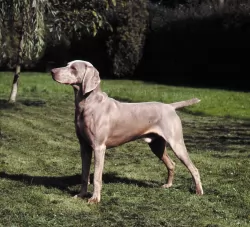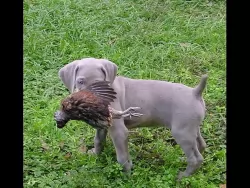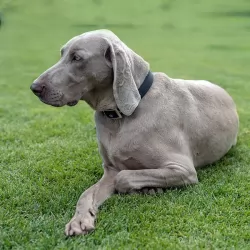 MyDogBreeds
MyDogBreeds Smooth Haired Weimaraner is originated from Germany but Bichonpoo is originated from Australia. Smooth Haired Weimaraner may grow 35 cm / 14 inches higher than Bichonpoo. Smooth Haired Weimaraner may weigh 32 kg / 71 pounds more than Bichonpoo. Both Smooth Haired Weimaraner and Bichonpoo has almost same life span. Smooth Haired Weimaraner may have more litter size than Bichonpoo. Smooth Haired Weimaraner requires Low maintenance. But Bichonpoo requires High maintenance
Smooth Haired Weimaraner is originated from Germany but Bichonpoo is originated from Australia. Smooth Haired Weimaraner may grow 35 cm / 14 inches higher than Bichonpoo. Smooth Haired Weimaraner may weigh 32 kg / 71 pounds more than Bichonpoo. Both Smooth Haired Weimaraner and Bichonpoo has almost same life span. Smooth Haired Weimaraner may have more litter size than Bichonpoo. Smooth Haired Weimaraner requires Low maintenance. But Bichonpoo requires High maintenance
 The Smooth Haired Weimaraner is a beautiful silvery-grey dog that was once bred for hunting way back in the 19th century.
The Smooth Haired Weimaraner is a beautiful silvery-grey dog that was once bred for hunting way back in the 19th century.
He has always been described as an all-purpose gun dog bred from crossing different German and French hunting dogs with the Bloodhound.
History of this dog dates back to 1897. This is when a club was formed in Germany for the breed.
 This popular little dog was developed by crossing the Poodle with the Bichon Frise to create the Bichonpoo. They are also called the Poochon and sometimes called the Birchpoo. They are a soft, curly breed and they are extremely cute – a very cuddly breed. They are not recognized by the AKC, CKC or the UKC. Some other kennel clubs do accept them and welcome them into obedience and agility trials. The breed was originally developed in Australia as a household pet for those who want a “curly lap dog” that was hypoallergenic, did not shed and had a great temperament for life in families with children. They were first developed in the latter part of the 20th century.
This popular little dog was developed by crossing the Poodle with the Bichon Frise to create the Bichonpoo. They are also called the Poochon and sometimes called the Birchpoo. They are a soft, curly breed and they are extremely cute – a very cuddly breed. They are not recognized by the AKC, CKC or the UKC. Some other kennel clubs do accept them and welcome them into obedience and agility trials. The breed was originally developed in Australia as a household pet for those who want a “curly lap dog” that was hypoallergenic, did not shed and had a great temperament for life in families with children. They were first developed in the latter part of the 20th century.
 The lean, well muscled Smooth Haired Weimaraner is athletic to look at, brimming with energy and vitality. The coat is smooth and short and is a magnificent steel grey to silver coat which even tends to be a blue-grey color.
The lean, well muscled Smooth Haired Weimaraner is athletic to look at, brimming with energy and vitality. The coat is smooth and short and is a magnificent steel grey to silver coat which even tends to be a blue-grey color.
The short coat makes the dog low maintenance. He is also a low shedding dog. He is a medium to large sized dog standing at between 57 and 70cm in height and weighing in the region of 25 to 40kg.
The tail has always been docked, giving him that distinctive, dignified appearance. The tail then measures about 6 inches in length.
These dogs are also excellent water dogs with their webbed paws. The ears of the dog are medium length and floppy and the eyes are light amber or a blue-grey color.
You just have to look at the Smooth Haired Weimaraner and you can see how he just loves being with his human owner all the time, so much so that he is known for separation anxiety. Sometimes he can become so distraught separated from his owner that he can even injure himself trying to reach his owner. Being separated for too long can cause him anxiety issues.
Certainly this dog is going to need the right kind of training and socialization to calm him. They’re also full of energy too and are going to require a good amount of exercise.
 This Bichon Frise-Poodle cross is a small dog with big personality. The original hybrid is 50% Poodle and 50% Bichon Frise. This is considered a first-generation hybrid. The second-generation hybrid is 50% Bichonpoo and 50% purebred Bichon Frise or Poodle. Then third generation hybrids are a cross between two second generation dogs. There is no fourth generation and most breeders do not offer even a third generation. The original hybrid can be healthier than the parents, but any flaws tend to show up in 2nd generation hybrids and it gets worse with third generation. This dog should be hardy, well-proportioned and robust. They are small, sweet and sturdy. Because there are three different sizes of Poodles, there can be three different sizes of the Bichon Poo – Standard, Mini and Toy.
This Bichon Frise-Poodle cross is a small dog with big personality. The original hybrid is 50% Poodle and 50% Bichon Frise. This is considered a first-generation hybrid. The second-generation hybrid is 50% Bichonpoo and 50% purebred Bichon Frise or Poodle. Then third generation hybrids are a cross between two second generation dogs. There is no fourth generation and most breeders do not offer even a third generation. The original hybrid can be healthier than the parents, but any flaws tend to show up in 2nd generation hybrids and it gets worse with third generation. This dog should be hardy, well-proportioned and robust. They are small, sweet and sturdy. Because there are three different sizes of Poodles, there can be three different sizes of the Bichon Poo – Standard, Mini and Toy.
 Your distinctive silvery-grey Weimaraner with his velvety ears and striking eyes is such a loving dog, desiring to be with his human family as much as possible.
Your distinctive silvery-grey Weimaraner with his velvety ears and striking eyes is such a loving dog, desiring to be with his human family as much as possible.
They are also good with children. Their loving nature and eagerness to please will ensure that you have a fully integrated 4 legged family member in your home who wants to be involved with everything you're busy with.
 The Bichonpoo is affectionate, intelligent and active just as you might expect from a Poodle/Bichon Frise cross. He loves people and lives well with other animals. He is particularly fond of children and loves to play with gentle older children. However, the temperament and characteristics of the hybrid are not as predictable as their parents. The characteristics of the Bichonpoo depends upon its lineage – if it is first generation, second generation or third generation. With each successive generation there is less predictability in the characteristics of the individual dog. Regardless of generation, the Bichonpoo will need exercise and mental stimulation. They are loving, good-natured and accommodating to their environment. They want to be with their owner and can get very attached.
The Bichonpoo is affectionate, intelligent and active just as you might expect from a Poodle/Bichon Frise cross. He loves people and lives well with other animals. He is particularly fond of children and loves to play with gentle older children. However, the temperament and characteristics of the hybrid are not as predictable as their parents. The characteristics of the Bichonpoo depends upon its lineage – if it is first generation, second generation or third generation. With each successive generation there is less predictability in the characteristics of the individual dog. Regardless of generation, the Bichonpoo will need exercise and mental stimulation. They are loving, good-natured and accommodating to their environment. They want to be with their owner and can get very attached.
Depending on their parents they can be anxious and high strung like the Poodle or nippiness and ‘small dog syndrome’ of the Bichon Frise. Separation anxiety can be a major issue with this breed. Do not let your Bichonpoo become dominate in your home or they will assume the alpha position and become very bossy, especially with children. He is easy to train and a good watchdog as well.
 There are some common dog illnesses that most dog owners fear, and hip dysplasia is one. Fortunately the Orthopedic Foundation for Animals tells us that Weimaraners aren’t prone to this dysplasia the way some dogs are.
There are some common dog illnesses that most dog owners fear, and hip dysplasia is one. Fortunately the Orthopedic Foundation for Animals tells us that Weimaraners aren’t prone to this dysplasia the way some dogs are.
One cause for concern however is bloat, and as a deep chested dog breed, the Short Haired Weimaraner can be prone to this life threatening illness.
Known also as gastric torsion, the stomach swells up and the dog becomes lethargic and restless. Immediate veterinary intervention is required. One way to diminish your dog’s chances of getting bloat is to rather feed him two smaller meals a day as opposed to one large meal.
Also, skin allergies are fairly common with these dogs. If redness appears on the skin or the skin is dry and itchy with a rash and he is losing his hair, you may well need to get your pet to the vet. It is why we always recommend giving your pet some raw meat added to the diet and this can help to prevent skin allergies.
 The Bichonpoo is usually healthier than either the Poodle or the Bichon Frise. At the same time, they could inherit any of health concerns of either of their parents in the first generation Bichonpoo. They are however likely to develop ear infections and skin allergies. Cleaning and grooming is essential, especially the ears, but also to prevent matting which could lead to skin infections.
The Bichonpoo is usually healthier than either the Poodle or the Bichon Frise. At the same time, they could inherit any of health concerns of either of their parents in the first generation Bichonpoo. They are however likely to develop ear infections and skin allergies. Cleaning and grooming is essential, especially the ears, but also to prevent matting which could lead to skin infections.
 Every dog, especially the Smooth Haired Weimaraner with his anxiety issues, should be trained and socialized, and these dogs are easy to train because they’re intelligent and they want to please.
Every dog, especially the Smooth Haired Weimaraner with his anxiety issues, should be trained and socialized, and these dogs are easy to train because they’re intelligent and they want to please.
The short silvery coat simply requires a good brush-down twice a week to remove the few loose hairs there are. Even if you don’t need to brush him, just do it because of the type of dog the Weimaraner is.
He loves the closeness of owner and dog. It’s a good time to check him over for ticks and fleas, to feel for unusual lumps, to look inside his ears for signs of infection, to check his eyes too, that they’re bright and clear.
If you feed your Smooth Haired Weimaraner commercially manufactured dog food, it needs to be one of the best ones with fairly high protein content. If feeding kibble, you can enhance the food by adding in some tasty home-made food. The Weimaraner’s stomach is easily upset so you want to add in easily digestible home-made food free of exotic spices and richness.
Boiled chicken, brown rice or pasta and spinach, sweet potatoes and carrots is super tasty and nutritious. Your Weimaraner will love such simple, good food and you can add a little to his dry kibble twice a week.
Also important is to add in some raw meat as this ensures a healthy skin. Make sure he has a constant supply of cool, fresh water.
 The Bichonpoo is an energetic little dog and needs enough nutrition to keep up with his needs. Feed a Bichonpoo at least twice a day – small meals- and dry food because of dental issues. A high-quality food will help to prevent allegories.
The Bichonpoo is an energetic little dog and needs enough nutrition to keep up with his needs. Feed a Bichonpoo at least twice a day – small meals- and dry food because of dental issues. A high-quality food will help to prevent allegories.
The Bichonpoo is the product of the poodle who is prone to bloat and Addison’s Disease and the Bichon Frise who is susceptible to Patella luxation, progressive retinal atrophy and liver shunts. The first generation Bichonpoo should be free of these health concerns. You should be aware that there is a possibility that the first-generation hybrid could contract any of its parents’ illnesses or deficiencies.
This hybrid is a high energy dog and needs daily exercise in the form of walks and play. They have the intelligence and skill of the Poodle with the energetic desire to play of the Bichon Frise. They need toys and a person to play with. She will need to be both mentally and physically stimulated. If she gets bored she will become destructive and noisy with barks and whines.